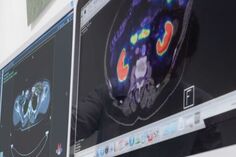Forschungsgruppe Gastrointestinale Tumore
Die Forschungsgruppe Gastrointestinale-Tumore in der Radioonkologie befasst sich mit der Erforschung strahlentherapeutischer Verfahren und Therapieansätze bei der Behandlung von Tumoren im Bereich des gesamten Gastrointestinaltraktes. Dabei handelt es sich um eine Vielzahl an anatomischen Lokalisationen: Speiseröhre, Magen, Bauchspeicheldrüse, Leber, Dünn- und Dickdarm. Häufig werden ebenso sekundäre Tumore, nämlich Metastasen, behandelt. Um eine optimale Therapie gastrointestinaler Krebserkrankungen zu erreichen, ist eine enge interdisziplinäre Zusammenarbeit von Chirurgie, Gastroenterologie, Strahlentherapie und internistischer Onkologie nötig. Ansatz neuer Therapiestrategien betreffen somit alle Kooperationspartner, so dass klinische Studien zu den jeweiligen Themengebieten mit Unterstützung der jeweiligen Fachabteilung durchgeführt werden. Zur Behandlung dieser Krankheitsbilder stehen an der Klinik für Radioonkologie und Strahlentherapie eine Vielzahl strahlentherapeutischer Techniken zur Verfügung. Diese belaufen sich auf klassischen Linearbeschleunigern, wie eine 3D-Konformale (3D-CRT) oder Intensitätsmodulierte Radiotherapie (IMRT). Aber wir haben auch die Option, Tumore stereotaktische Radiotherapie, u. a. am Cyberknife oder MR-LINAC durchzuführen. Auch die Partikeltherapie mittels Protonen und Kohlenstoffionen am Heidelberger Ionenstrahlen-Therapiezentrum stellt bei einigen Tumorlokalisationen eine Therapieoption dar. Ferner besteht auch die Möglichkeit einer intraoperativen Radiotherapie (IORT).
The Gastrointestinal Tumors in Radiation Oncology research group is involved in the study of radiotherapeutic procedures and therapeutic approaches in the treatment of tumors in the entire gastrointestinal tract. This involves a variety of anatomical locations: Esophagus, stomach, pancreas, liver, small and large intestine. Secondary tumors, namely metastases, are also frequently treated. In order to achieve an optimal therapy of gastrointestinal cancers, a close interdisciplinary cooperation of surgery, gastroenterology, radiotherapy and internal oncology is necessary. Approaches to new therapeutic strategies thus involve all cooperation partners, so that clinical studies on the respective topics are carried out with the support of the respective specialist department. For the treatment of these disease patterns, a variety of radiotherapeutic techniques are available at the Department of Radiation Oncology and Radiotherapy. These amount to linear accelerators, such as 3D-conformal (3D-CRT) or intensity-modulated radiotherapy (IMRT). But we also have the option of performing tumor stereotactic radiotherapy, including on the Cyberknife or MR-LINAC. Particle therapy using protons and carbon ions at Heidelberg Ion Radiation Therapy Center is also a therapeutic option for some tumor localizations. Furthermore, there is also the possibility of intraoperative radiotherapy (IORT)
Ärztliche Mitarbeiter-/Innen
PD Dr. med. Kristin Uzun-Lang
Geschäftsführende Oberärztin, Arbeitsgruppenleiterin Gastrointestinale und Dermatologische-Tumore, Partikeltherapie, Intraoperative Strahlentherapie (IORT), Ganzkörperbestrahlung (TBI), Palliativmedizin
PD Dr. med. Jakob Liermann
Erster Oberarzt, AG-Leitung Urologische Tumoren, AG-Leitung Pankreaskarzinome und Hepatobiliäre Tumoren

Dr. med. Christoph Grott
FA für Strahlentherapie, Forschungsschwerpunkt: Ösophaguskarzinome, PEGASUS-Studie

Dr. med. Tilmann Rackwitz
Oberarzt, Forschungsschwerpunkt: Dermatologische-Tumore, benigne Bestrahlung

PD Dr. med. Nathalie Arians
Oberärztin, Forschungsschwerpunkt Gynäkologische Tumore, DILANA-Studie beim Analkarzinom (Mutterschutz/Elternzeit)
Doktorand-/innen
Kooperationspartner-/innen
Studienkoordination Radioonkologie (Dr. Adriane Hommertgen und Dr. Cornelia Jäkel)
NCT (Tumoren des Magens/der Speiseröhre):
PD Dr. Georg Martin Haag (Medizinische Onkologie)
Prof. Dr. C. Michalski (Klinik für Allgemein-, Viszeral- und Transplantationschirurgie)
NCT (Tumoren des Darms):
PD Dr. B. Köhler (Medizinische Onkologie)
Prof. Dr. C. Michalski (Klinik für Allgemein-, Viszeral- und Transplantationschirurgie)
NCT (Tumoren der Bauchspeicheldrüse):
Prof. Dr. Dr. Springfeld (Medizinische Onkologie)
Forschungsschwerpunkte
- Auswertung Langzeit Follow-Up Pandora-Studie zur Re-RT beim Rektumkarzinom (Phase I/II PANDORA-01 trial)
- Predicting Esophageal Cancer Borders using PET-Imaging (PEGASUS Study): Monozentrische, prospektive, offene, einarmige diagnostische Pilotstudie, Studienziel: Korrelation der bildgebenden und mikroskopischen Tumorgrenzen nach definitiv operativer sowie nach neoadjuvanter und operativer Therapie des Ösophaguskarzinoms.
- Presto-Studie, Organ preservation with durvalumab-based immunotherapy in combination with chemoradiation as definitive therapy for early stage, cT1 and cT2N0, esophageal adenocarcinoma with indication for radical surgery: A prospective, multicenter study of the FLOT-AIO Gastric Cancer Group
- Toxizitätsreduktion durch elektive versus befallene Lymphabflusswegbestrahlung beim Ösophaguskarzinom
- Ansprechraten nach palliativ-hämostyptischer Radiotherapie auf Hb-Wert
- Atemwegsmanagement in der Anästhesie nach Radiotherapie von Patienten mit Ösophaguskarzinom
- Atemwegsmanagement in der Anästhesie nach Radiotherapie von Patienten mit Nasopharynxkarzinom
Studien
- DILANA-Studie (rekrutiert, prospektiv randomisierte Studie) Bestrahlung von weiblichen Analkarzinompatientinnen mit normalem oder Spezialtampon
- PACK-Studie (follow-up, prospektiv randomisierte Studie) Pankreaskarzinom und Kohlenstoffionenbestrahlung
- MASPAC (in Rekrutierung, MR-Guided Adaptive Stereotactic Body Radiotherapy (SBRT) of Primary Tumor for Pain Control in Metastatic Pancreatic Ductal Adenocarcinoma (mPDAC)
- Selrec (in Rekrutierung, Selective Neoadjuvant Therapy of Rectal Cancer Patients: SELREC a randomized controlled, open, multicentre non-inferiority trial)
Literatur / Publikationen
- Uzun DD, Zimmermann TN, Schmitt FCF, Plinkert PK, Weigand MA, Debus J, Held T, Uzun-Lang K. Radiotherapy Effects on Airway Management in Patients with Nasopharyngeal Cancer. Cancers (Basel). 2024 Nov 10;16(22):3781. doi: 10.3390/cancers16223781. PMID: 39594736; PMCID: PMC11593293.
- Uzun DD, Tryjanowski T, Arians N, Mohr S, Schmitt FCF, Michalski CW, Weigand MA, Debus J, Lang K. Impact of Radiotherapy on Endotracheal Intubation Quality Metrics in Patients with Esophageal Cancer: A Challenge for Advanced Airway Management? Cancers (Basel). 2024 Jul 15;16(14):2540. doi: 10.3390/cancers16142540. PMID: 39061180; PMCID: PMC11274552.
- Uzun DD, Salatzki J, Xynogalos P, Frey N, Debus J, Lang K. Effects of Ionizing Radiation on Cardiac Implantable Electronic Devices (CIEDs) in Patients with Esophageal Cancer Undergoing Radiotherapy: A Pilot Study. Cancers (Basel). 2024 Jan 28;16(3):555. doi: 10.3390/cancers16030555. PMID: 38339306; PMCID: PMC10854512.
- R. Glynne-Jones, D. Sebag-Montefiore et al., Mitomycin or cisplatin
- chemoradiation with or without maintenance chemotherapy for treatment of squamous-cell
- carcinoma of the anus (ACT II): a randomised, phase 3, open-label, 2 x 2 factorial trial, Lancet Oncol 14(6) (2013) 516-24.
- Ajani et al. Fluorouracil, mitomycin, and radiotherapyvsfluorouracil, cisplatin, and radiotherapyforcarcinomaoftheanal canal: a randomizedcontrolledtrial. Jama2008; 299:1914-21
- Rödel et al. Human papillomavirusDNA loadand p16INK4a expressionpredictforlocalcontrolin patientswithanal squamouscellcarcinomatreatedwithchemoradiotherapy. International journalofcancer2015; 136:278-88
- Rödel et al. The immune microenvironmentand HPV in anal cancer: Rationale tocomplementchemoradiationwithimmunotherapy. BiochimBiophysActa. 2017May 10;1868(1):221-230. doi: 10.1016/j.bbcan.2017.05.001.
- Morris et al. Nivolumabforpreviouslytreatedunresectablemetastaticanal cancer(NCI9673): a multicentre, single-arm, phase2 study, Lancet Oncol. (2017)
- RTOG 8501, Chemoradiotherapy of Locally Advanced Esophageal Cancer: Long-term Follow-up of a Prospective Randomized Trial, Cooper et al. JAMA 1999
- Sauer, R., et al., Preoperative versus postoperative chemoradiotherapy for rectal cancer.
- N Engl J Med, 2004. 351(17): p. 1731-40.
- Sauer, R., et al., Preoperative versus postoperative chemoradiotherapy for locally advanced rectal cancer: results of the German CAO/ARO/AIO-94 randomized phase III trial after a median follow-up of 11 years. J Clin Oncol, 2012. 30(16): p. 1926-33.
- Oxaliplatin added to fl uorouracil-based preoperative chemoradiotherapy and postoperative chemotherapy of locally advanced rectal cancer (the CAO/ARO/AIO-04 study): final results of the multicentre, open-label, randomised, phase 3 trial, Lancet Oncol 2015 Aug;16(8):979-89. doi: 10.1016/S1470-2045(15)00159-X.
- Nonoperative management of rectal cancer: identifying the ideal patients. Habr-Gama A, São Julião GP, Perez RO, Hematol Oncol Clin North Am. 2015 Feb; 29(1):135-51.
- Bahadoer (2020), Short-course radiotherapy followed by chemotherapy before total mesorectal excision (TME) versus preoperative chemoradiotherap y, TME, and optional adjuvant chemotherapy in locally advanced rectal cancer (RAPIDO): a randomised, openlabel, phase 3 trial. Lancet Oncol 2021; 22: 29–42








